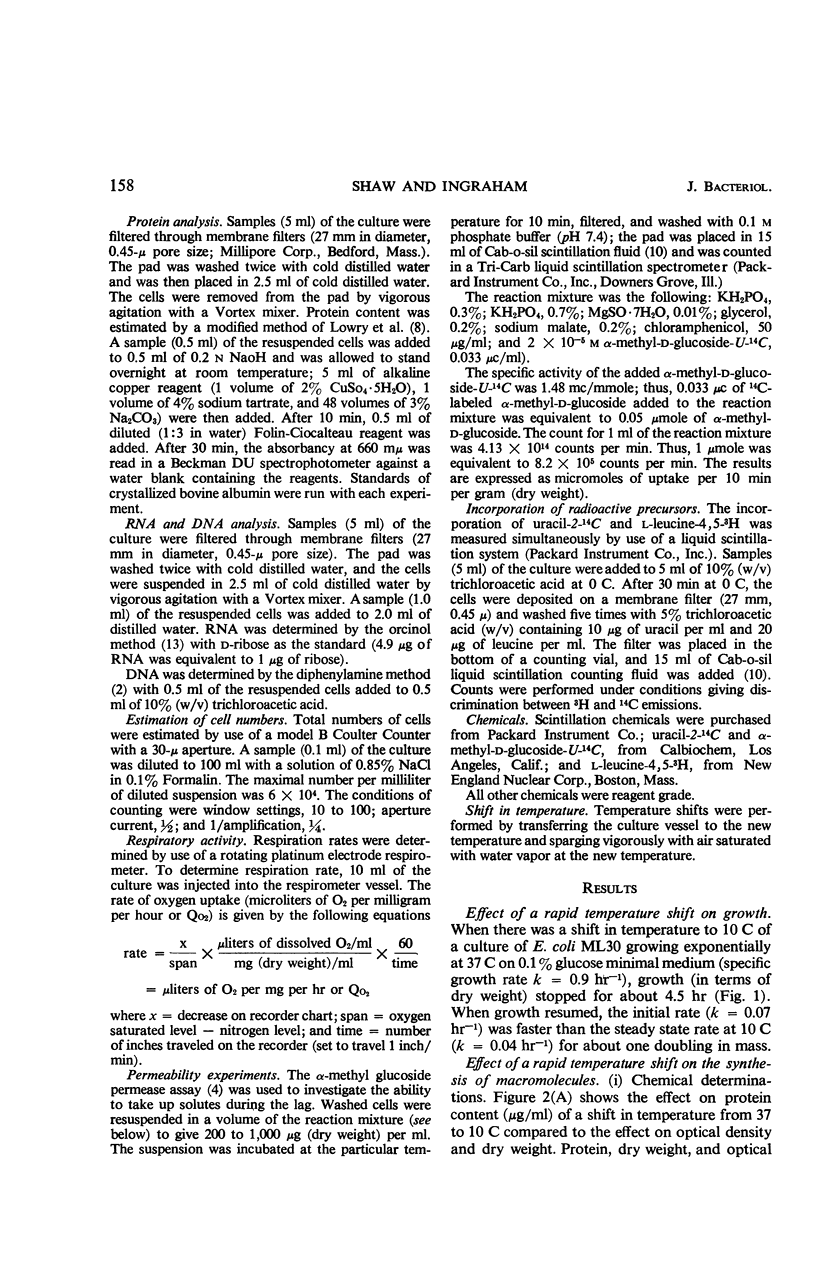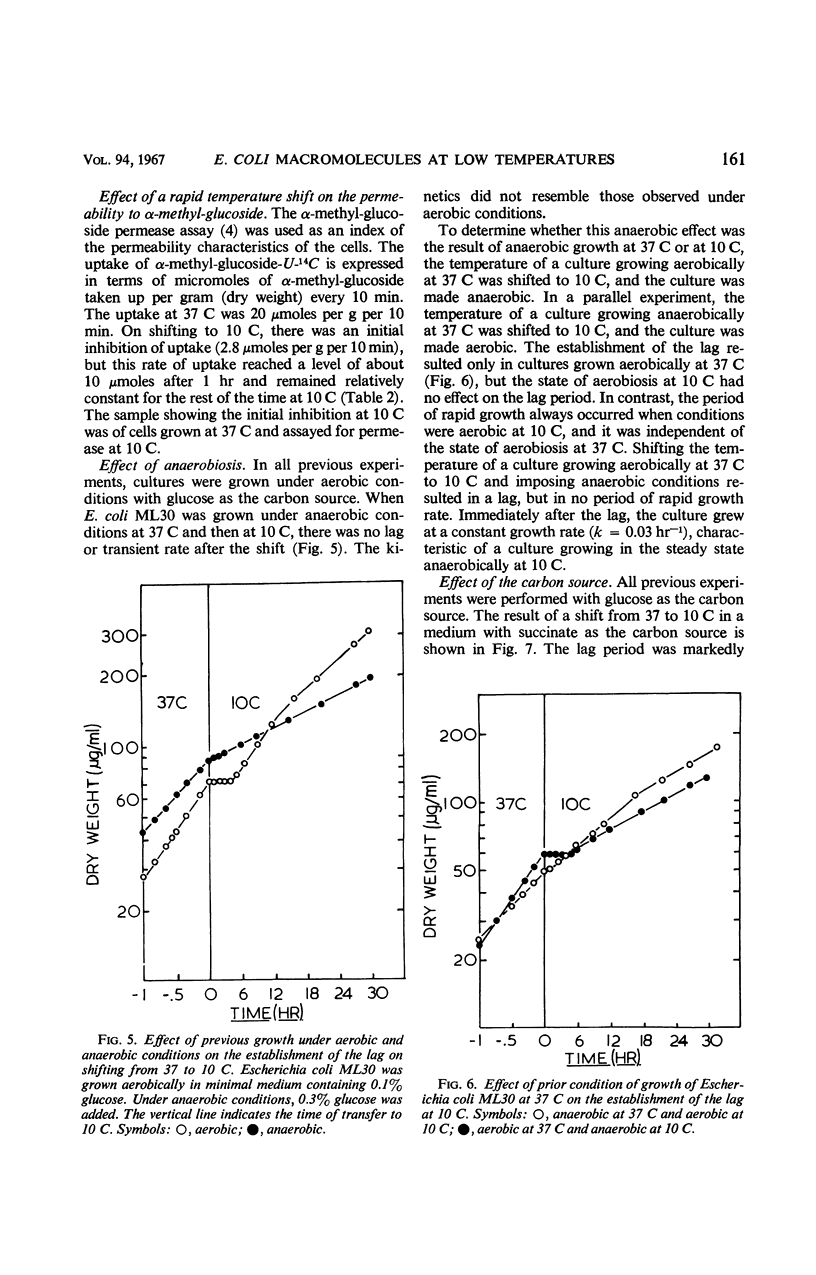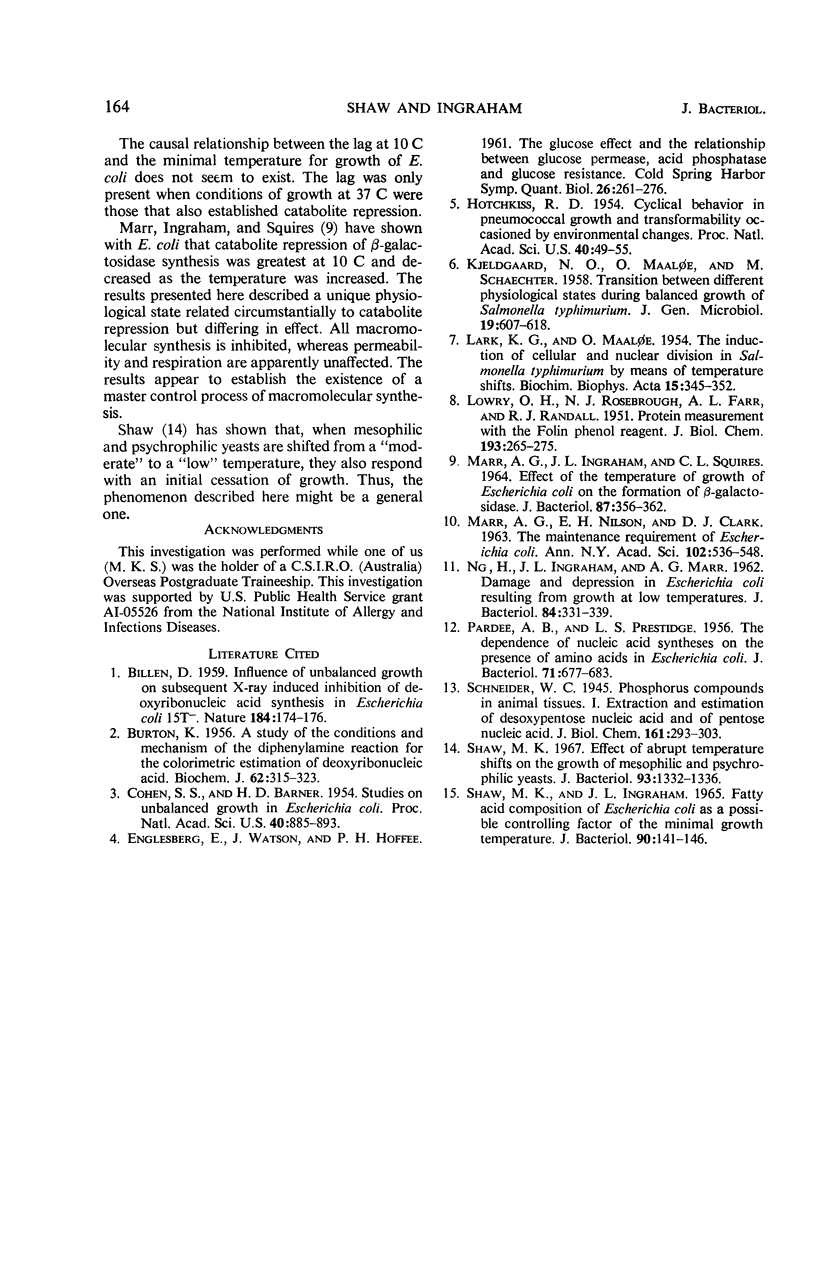Abstract
When a culture of Escherichia coli ML30 growing exponentially at 37 C in a glucose minimal medium was shifted abruptly to 10 C, growth decreased for about 4.5 hr. There was no net synthesis of deoxyribonucleic acid (DNA), ribonucleic acid (RNA), and protein. The cells, however, respired at a rate characteristic of cells growing in the steady state at 10 C and were able to accumulate α-methyl-d-glucoside. When growth recommenced at 10 C, protein synthesis started at 4 hr, RNA synthesis, with a burst at 6 hr, and DNA synthesis, with a burst at 7 hr. One synchronous division occurred at about 11 hr after shifting to 10 C. There was no alteration in the steady-state RNA to protein ratio. The results are discussed in relation to other reported effects of shifts in environmental conditions. The lag at 10 C was dependent on prior conditions of growth at 37 C. Growth at 37 C under conditions giving catabolite repression were necessary for the lag to be established on shifting to 10 C.
Full text
PDF







Selected References
These references are in PubMed. This may not be the complete list of references from this article.
- BURTON K. A study of the conditions and mechanism of the diphenylamine reaction for the colorimetric estimation of deoxyribonucleic acid. Biochem J. 1956 Feb;62(2):315–323. doi: 10.1042/bj0620315. [DOI] [PMC free article] [PubMed] [Google Scholar]
- Cohen S. S., Barner H. D. STUDIES ON UNBALANCED GROWTH IN ESCHERICHIA COLI. Proc Natl Acad Sci U S A. 1954 Oct;40(10):885–893. doi: 10.1073/pnas.40.10.885. [DOI] [PMC free article] [PubMed] [Google Scholar]
- ENGLESBERG E., WATSON J. A., HOFFEE P. A. The glucose effect and the relationship between glucose permease, acid phosphatase, and glucose resistance. Cold Spring Harb Symp Quant Biol. 1961;26:261–276. doi: 10.1101/sqb.1961.026.01.033. [DOI] [PubMed] [Google Scholar]
- Hotchkiss R. D. CYCLICAL BEHAVIOR IN PNEUMOCOCCAL GROWTH AND TRANSFORMABILITY OCCASIONED BY ENVIRONMENTAL CHANGES. Proc Natl Acad Sci U S A. 1954 Feb;40(2):49–55. doi: 10.1073/pnas.40.2.49. [DOI] [PMC free article] [PubMed] [Google Scholar]
- KJELDGAARD N. O., MAALOE O., SCHAECHTER M. The transition between different physiological states during balanced growth of Salmonella typhimurium. J Gen Microbiol. 1958 Dec;19(3):607–616. doi: 10.1099/00221287-19-3-607. [DOI] [PubMed] [Google Scholar]
- LARK K. G., MAALØE O. The induction of cellular and nuclear division in Salmonella typhimurium by means of temperature shifts. Biochim Biophys Acta. 1954 Nov;15(3):345–356. doi: 10.1016/0006-3002(54)90036-0. [DOI] [PubMed] [Google Scholar]
- LOWRY O. H., ROSEBROUGH N. J., FARR A. L., RANDALL R. J. Protein measurement with the Folin phenol reagent. J Biol Chem. 1951 Nov;193(1):265–275. [PubMed] [Google Scholar]
- MARR A. G., INGRAHAM J. L., SQUIRES C. L. EFFECT OF THE TEMPERATURE OF GROWTH OF ESCHERICHIA COLI ON THE FORMATION OF BETA-GALACTOSIDASE. J Bacteriol. 1964 Feb;87:356–362. doi: 10.1128/jb.87.2.356-362.1964. [DOI] [PMC free article] [PubMed] [Google Scholar]
- NG H., INGRAHAM J. L., MARR A. G. Damage and derepression in Escherichia coli resulting from growth at low temperatures. J Bacteriol. 1962 Aug;84:331–339. doi: 10.1128/jb.84.2.331-339.1962. [DOI] [PMC free article] [PubMed] [Google Scholar]
- PARDEE A. B., PRESTIDGE L. S. The dependence of nucleic acid synthesis on the presence of amino acids in Escherichia coli. J Bacteriol. 1956 Jun;71(6):677–683. doi: 10.1128/jb.71.6.677-683.1956. [DOI] [PMC free article] [PubMed] [Google Scholar]
- Shaw M. K. Effect of abrupt temperature shift on the growth of mesophilic and psychrophilic yeasts. J Bacteriol. 1967 Apr;93(4):1332–1336. doi: 10.1128/jb.93.4.1332-1336.1967. [DOI] [PMC free article] [PubMed] [Google Scholar]
- Shaw M. K., Ingraham J. L. Fatty Acid Composition of Escherichia coli as a Possible Controlling Factor of the Minimal Growth Temperature. J Bacteriol. 1965 Jul;90(1):141–146. doi: 10.1128/jb.90.1.141-146.1965. [DOI] [PMC free article] [PubMed] [Google Scholar]


